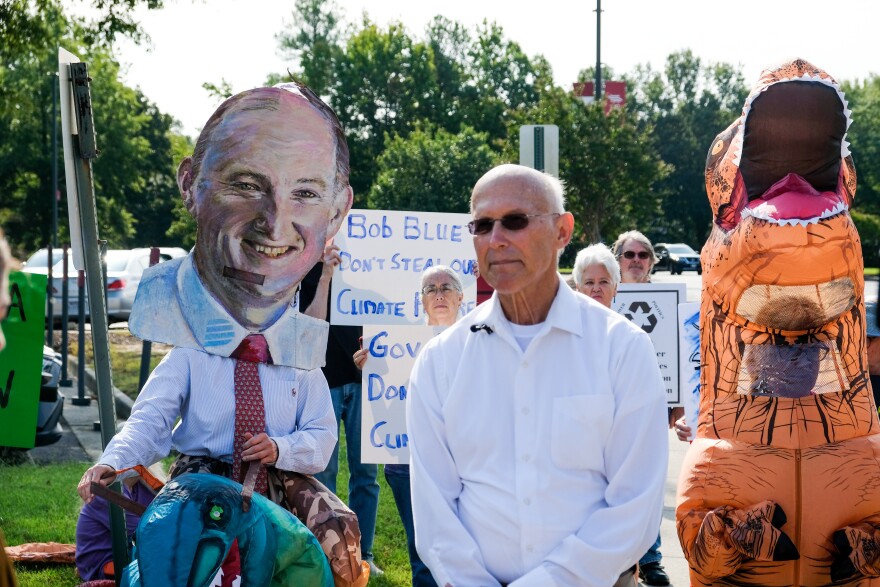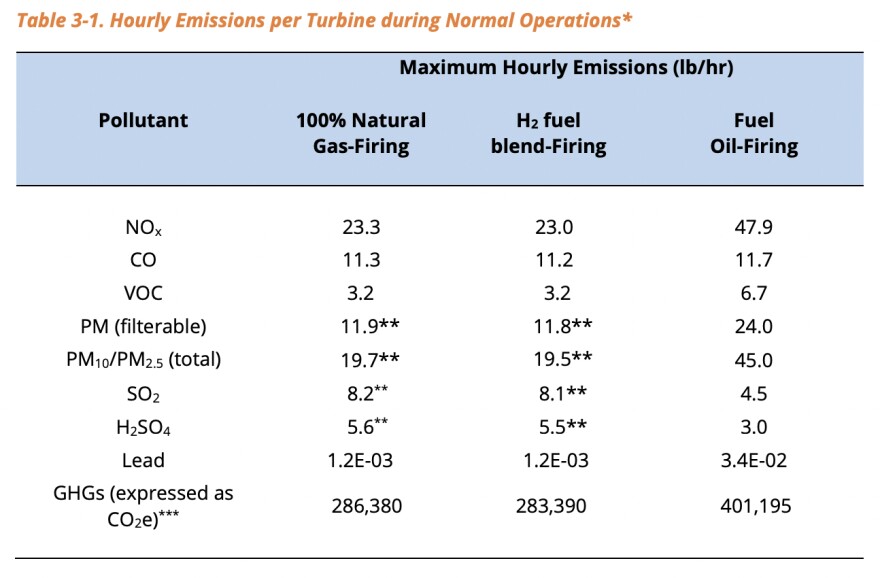The Virginia Department of Environmental Quality shared an emissions analysis for a proposed natural gas power plant with the state Air Pollution Control Board, drawing a contingent of protesters.
Dominion Energy wants to bring the Chesterfield Energy Reliability Center online in the next few years, saying it would provide up to 1,000 MW of electricity during peak demand hours or in grid emergencies. It would be built adjacent to the Chesterfield Power Station, which retired its last two coal-fired generators this year.
Environmentalists were outside the Wednesday meeting at Reynolds Community College in Henrico County. They gathered to protest the plant and held a mock “race to climate oblivion,” wearing oversized masks of Gov. Glenn Youngkin and Dominion CEO Bob Blue. Groups like Third Act and the Chesapeake Climate Action Network have been vocal in their opposition to the project.
Mike Dowd, director of the Air and Renewable Energy Division at DEQ, told the air board that this is the first time it had been presented with a permit listed as “controversial,” due to a new law passed in 2022. That means the proposed plant is a “major source” and will produce significant emissions.
According to DEQ, any pollution source that is expected to release more than 100,000 tons per year of carbon dioxide equivalents — a figure which takes into account methane and other greenhouse gases of varying potency — is "major."

The Chesterfield center’s expected yearly greenhouse gas emissions, according to Dowd’s presentation, surpasses the 100,000-ton threshold at 2.2 million tons of CO2 equivalents.
The 2022 law requires DEQ to give an update on any “controversial” permits at all air board meetings.
The project is designed with Dominion’s goal of quick, reliable power generation in mind. The reliability center would consist of four single-cycle natural gas turbines — which start up more quickly but are less efficient than other designs.
According to the U.S. Energy Information Administration, that type of turbine loses a lot of energy to heat: “[E]nergy from the primary conversion exhaust heat is lost and not sent to another turbine.”
CERC would also include eight fuel oil storage tanks: a 12-million-gallon tank, six 3,500-gallon tanks and one 500-gallon tank. Dowd said that would allow Dominion to utilize the power plant in cold weather.
Previous winter storms have threatened or halted natural gas supplies.
“That was an issue for several power plants around, when the gas supplies were curtailed. That’s why they say they need the oil,” Dowd said.
It would mostly be run on natural gas. The fuel oil will be available if needed, though with higher emissions. Dowd said the plant could also run on a cleaner hydrogen-natural gas fuel blend.
According a Dominion report filed with DEQ and prepared by Environmental Consulting & Technology Inc., the hydrogen fuel blend would reduce greenhouse gas emissions by about 3,000 pounds per hour, while fuel oil would increase emissions by about 115,000 pounds in a maximum-emissions scenario.

In filings with DEQ, Dominion estimated the four proposed turbines would run, on average, 37% of the time each year — or for 3,240 hours.
Environmentalists protesting the plant said Dominion’s framing of the proposal is misleading. They argue “peaker” plants generally run more frequently than the company said the Chesterfield facility will be used.
“It’s gonna run over 30% of the time, which really means it’s gonna run a lot,” said Glen Besa, former director of the Virginia Chapter of the Sierra Club, now an activist with Third Act Virginia.
Besa pointed to a range of recent weather events that scientists believe have been worsened by climate change, such as this summer’s heat waves in the Southeast and other parts of the U.S.
He said Virginia should not be permitting new fossil fuel infrastructure. Instead, the state should be investing more in renewables and battery storage to stop contributing to planet-heating carbon emissions.
“[Dominion is] basically still on the old model of central, big power plants when, in fact, we need to diversify, we need distributed power,” Besa said.
Besa said he and other environmentalists have discussed the plant with Chesterfield County supervisors, trying to rally opposition. The county’s Board of Supervisors has to grant Dominion permission to build the plant before environmental regulators have a chance to weigh in.
Dominion spokesperson Jeremy Slayton wrote in an email that Dominion is invested in renewables, with 85% of planned new generation coming from offshore wind, solar, battery storage and nuclear. But he said the company prioritizes grid stability.
“Offshore wind only works 50% of the time, solar about 25% and batteries only store electricity for 4-6 hours. That’s not going to keep the lights on 24/7, 365,” Slayton wrote. “We need a balanced energy mix, with renewables and always-ready natural gas working hand-in-hand. As customer demand nearly doubles over the next couple of decades, we’re going to need more reliable power on the hottest and coldest days, not less.”
Dowd noted to board members that DEQ had begun a formal air quality analysis of the project, which is required for "major sources." That, however, won’t be complete until after the Chesterfield board’s decision.
Dowd estimated the permit could be ready for DEQ’s final consideration by 2025.
Editor's note: Dominion Energy is a VPM donor.



